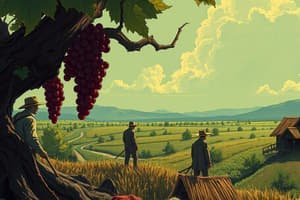Podcast
Questions and Answers
What does the phrase 'sock it to 'em!' signify in the context of capitalism?
What does the phrase 'sock it to 'em!' signify in the context of capitalism?
- Man's inhumanity
- Exploitations of the vulnerable
- Survival tactics - Marxist approach
- All of the above (correct)
What do the blazoned signs represent in the chapter?
What do the blazoned signs represent in the chapter?
Marketing and consumerism
What do the cars lined up symbolize?
What do the cars lined up symbolize?
Suspicion and exploitation of farmers
The rhetorical questions about buying a car indicate the farmers' _______?
The rhetorical questions about buying a car indicate the farmers' _______?
The salesman shows empathy towards confused farmers.
The salesman shows empathy towards confused farmers.
Match the phrases to their corresponding definitions:
Match the phrases to their corresponding definitions:
What does the repetition of 'I got to get a car' signify?
What does the repetition of 'I got to get a car' signify?
What does 'Good Used Cars' imply about the vehicles?
What does 'Good Used Cars' imply about the vehicles?
What criticism is being shown through the phrase 'We're runnin' a business, not a charity ward.'?
What criticism is being shown through the phrase 'We're runnin' a business, not a charity ward.'?
Flashcards are hidden until you start studying
Study Notes
Chapter 7 Themes and Concepts
- Highlights man's inhumanity and exploitation through the lens of capitalism, portraying a "dog eat dog" survival mentality.
- Consumerism emphasized with aggressive marketing tactics aimed at vulnerable farmers, obscuring rational decision-making.
Salesman's Characterization
- Salesmen depicted with dehumanizing traits; characterized by greed and a lack of empathy towards desperate farmers, focused solely on profits.
- Irony exists in the portrayal of salesmen who express disgust over potential customers' indecision, highlighting their cold-hearted nature.
Farmers' Desperation
- Farmers exhibit vulnerability and desperation in their interactions, portrayed as childlike and confused by their financial plight.
- The repetitive inquiries about car purchases underscore the urgency and helplessness felt by the farmers, reflecting their grim reality.
Industrialization and Mockery
- Reference to the "machine age" signifies the shift in society's reliance on technology, mocking the farmers' disconnection from modern advancements.
- This disconnect accentuates the broader theme of conflict between industrial progress and traditional agrarian values.
Greed and Moral Degradation
- Counting "jalopies" reveals an escalating greed within sales scenarios; the invocation of God juxtaposed with avarice highlights a moral decline.
- Oxymoronic use of religious references to justify monetary gain connects the theme of capitalism with biblical critiques of greed.
Presentation of Goods
- Car listings provide a facade of quality, reinforcing the idea of deception in capitalism and the frantic pace at which business is conducted.
- Friction between the affluent and the impoverished farmers mirrors class conflicts and signifies a breakdown in social obligations.
Capitalism Critique
- The assertion "We're runnin' a business, not a charity ward" emphasizes the exploitative nature of capitalism, suggesting that it neglects the welfare of those it should serve.
- Sarcasm in sales interactions underscores a twisted ideology where business is viewed solely through the lens of profit, rather than communal responsibility.
Studying That Suits You
Use AI to generate personalized quizzes and flashcards to suit your learning preferences.



